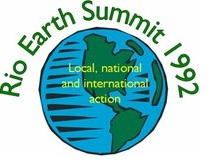Slow progress since Earth Summit 20 years ago

But even as new warnings were issued this week of impending disaster – more severe droughts, disease spread and land-effacing sea level rises – climate negotiators gathered in Bonn continued to bicker over procedure.
“Let’s consider climate change like you are in a car trying to stop before reaching a ledge. We are applying the brakes but we are still far away from decelerating enough not to fall from the ledge,” Wael Hmaidan, director of activist group Climate Action Network, told Agence France-Presse on the sidelines of the talks which ended Friday.
On Thursday, climate researchers said the planet could warm by more than 3.5 degrees Celsius (6.3 degrees Fahrenheit) by 2100 if countries do not raise their game.
The UN’s target is a 2 C (3.6 degree Fahrenheit) limit on warming from pre-industrial levels for manageable climate change.
Paul Hare from German policy research group Climate Analytics said the gap between countries’ promised interventions and the reality was “getting bigger.”
Article continues after this advertisementAnd the International Energy Agency said CO2 emissions from fossil fuel combustion reached a new high last year, providing “further evidence that the door to a 2 deg C trajectory is about to close.”
Article continues after this advertisementThe Earth Summit had yielded the UN Framework Convention on Climate Change, which in turn led to the Kyoto Protocol binding 37 rich nations to curbing greenhouse gas emissions.
“I would say that the climate negotiations at their twentieth anniversary are definitely moving in the right direction, but not at the speed and not at the scale” required, UN climate chief Christiana Figueres said in Bonn.
Scientists who monitor progress under the name Climate Action Tracker (CAT) say warming of 3.5 deg C could cause many plant and animal species to die out, deserts to expand and agricultural production to plummet.
They say the scenario can be avoided if governments raise their commitments considerably, and fast – cutting fossil fuel subsidies and boosting renewable energy production.
“The only thing that is creating the gap is a lack of political will,” said Hmaidan.
Alden Meyer, director of strategy and policy with the Union of Concerned Scientists, said climate change posed the greatest threat to the well-being of people and ecosystems 20 years after the Rio conference.
“It is not too late to address this threat, but scientists tell us the window for effective action is rapidly closing. Without much more ambitious action now, we will be condemning our children and grandchildren to suffer the consequences of truly dangerous levels of climate change.”
Countries agreed at UN climate talks in Durban, South Africa last December to draft a new climate pact by 2015.
Due to take effect from 2020, it should bind all countries to greenhouse gas emission cuts.
But gathered in Bonn for the past 11 days, negotiators tasked with laying the groundwork for the new deal got stuck in procedural bickering as battle lines were redrawn between rich nations and some in the developing world over apportioning responsibility for tackling global warming.
“The now-predictable drama and upheavals at the United Nations climate treaty talks underscored the precarious state of multilateral efforts to reach a new agreement to protect the world’s climate,” observed the Environmental Defense Fund.
Fast-growing economies like China and India, fearing emission cuts may slow their development engines, insist the developed world, which polluted more for longer, should bear a greater mitigation burden.
But the West and small countries most threatened by climate change are eager for the emerging polluters to step up to the plate.
Even as countries hurled accusations at one another in Bonn, all agreed on one thing: “it is getting very late”, in the words of EU climate commissioner Connie Hedegaard.
Some progress has been made as the world prepares for the Rio+20 summit on sustainable development next month and the next round of UN climate talks in Qatar in December.
Twenty years ago, when United States climate negotiator Jonathan Pershing attended the Earth Summit “we met in a room for the entire world that was the size of the room here”, he said – gesturing at a press conference room in Bonn.
“The most recent meeting than we had in Durban, we had 10,000 people and we had global coverage and we had heads of state.”
Every major economy in the world has now made a commitment to reducing greenhouse gas emissions, Pershing pointed out.
“I think the world is recognising how much damage could be caused but also the importance of acting.”